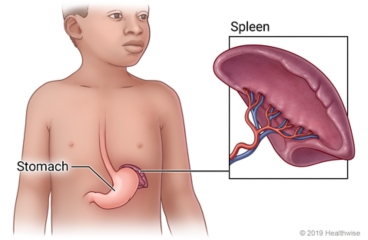Mononucleosis in Children: Care Instructions
Overview

Mononucleosis (mono) is an infection. It's usually caused by the Epstein-Barr virus. People get it through
contact with saliva and with mucus from the nose and throat. A child can get mono from kissing an infected
person. Or a child may get it after sharing a glass, fork, or spoon with someone who has mono.
Symptoms include a fever and a very sore throat. Your child may also have swollen glands and tonsils and feel
weak and tired.
Sometimes the virus causes the spleen to swell. The spleen is an organ in the upper left side of the belly.
If it ruptures, it's an emergency. So it's important for your child to avoid rough sports or challenging
activities while your child has mono. These can put extra pressure on the spleen.
It takes time to recover from mono. The lymph nodes in your child's neck may be larger than normal for a
while. Most children get better after 2 to 4 weeks. But it could take several more weeks before your child's
normal energy is back. Lots of rest will help your child feel better.
Follow-up care is a key part of your child's treatment and safety. Be sure to make and go to all
appointments, and call your doctor if your child is having problems. It's also a good idea to know your
child's test results and keep a list of the medicines your child takes.
How can you care for your child at home?
-
Have your child rest and stay in bed as much as possible until they feel well enough to be up.
-
Have your child drink plenty of fluids. Choose water and other clear liquids until your child feels
better.
-
Be safe with medicines. Have your child take medicines exactly as prescribed. Call your doctor if you
think your child is having a problem with a medicine.
-
Give your child acetaminophen (Tylenol) or ibuprofen (Advil, Motrin) for fever or pain. Be safe with
medicines. Read and follow all instructions on the label.
-
Do not give your child two or more pain medicines at the same time unless the doctor told you to. Many
pain medicines have acetaminophen, which is Tylenol. Too much acetaminophen (Tylenol) can be harmful.
-
Do not give aspirin to anyone younger than 20. It has been linked to Reye syndrome, a serious illness.
-
Do not let your child play contact sports or lift anything heavy for 4 weeks. These activities can
increase the chance that the spleen may rupture.
-
Try not to spread the virus to others. Make sure your child does not kiss or share dishes, glasses, eating
utensils, or toothbrushes. It's hard to know how long your child can spread the virus. This is because your
child could have it long after symptoms go away.
When should you call for help?
 Call 911
anytime you think your child may need emergency care. For example, call if:
Call 911
anytime you think your child may need emergency care. For example, call if:
Call your doctor now or seek immediate medical care if:
Watch closely for changes in your child's health, and be sure to contact your doctor if:
Current as of: June 12, 2023
Content Version: 14.0
Care instructions adapted under license by your
healthcare professional. If you have questions about a medical condition or this instruction, always ask
your healthcare professional. Healthwise, Incorporated disclaims any warranty or liability for your use of
this information.